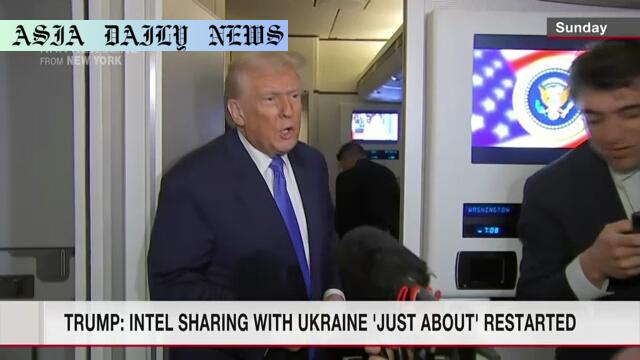Ukraine’s ceasefire talks gain momentum as US resumes intelligence sharing.
US halts intelligence sharing with Ukraine after a heated summit but resumes it partially.
Key meeting between US and Ukraine delegations planned in Saudi Arabia on Tuesday.
Ukraine Foreign Minister and presidential office head to attend talks.
US aiming to evaluate Kyiv’s readiness for improved ties and concessions.
Trump optimistic about positive outcomes from the discussions.

Background on US and Ukraine Intelligence Sharing Suspension
The decision of the United States to halt intelligence sharing with Ukraine came as an unexpected and critical move. Following a contentious meeting between US President Donald Trump and Ukrainian President Volodymyr Zelenskyy, strains were evident in the diplomatic ties. This suspension highlighted underlying tensions between the two administrations, raising questions concerning alignment on key security policies and cooperation amid ongoing regional instability in Eastern Europe.
The temporary cessation was a strategic signal from Washington, reflecting its intent to push for reassurances from Ukraine regarding its commitment to align its policies and concessions towards a potential ceasefire with Russia. This issue is of significant international concern as the simmering conflict in the region has broader implications for NATO, the European Union, and global stability.
The Resumption of Intelligence Sharing: A Renewed Outlook
President Trump’s recent announcement that the US has “just about” resumed intelligence sharing with Ukraine marks a pivot in policy, reflecting a renewed optimism. The timing of this decision coincides with a pivotal upcoming meeting in Saudi Arabia, where key officials from both nations will converge. This meeting holds high stakes, as it could dictate the trajectory of cooperation and peace negotiations in the region.
The United States delegation, represented by Secretary of State Marco Rubio and National Security Advisor Mike Waltz, is set to ascertain Ukraine’s seriousness in forging stronger ties. At the heart of these discussions are strategic concessions that Kyiv may need to make in order to foster a ceasefire and stabilize relations. Ukraine’s Foreign Minister Andrii Sybiha and Andriy Yermak, head of the presidential office, are among the prominent figures representing Kyiv, reflecting the gravity accorded to these talks by both sides.
Potential Outcomes of the Saudi Arabia Meeting
President Trump has expressed optimism about “pretty good results” emerging from the discussions. For Ukraine, such results may include not only the full resumption of intelligence sharing but also strategic backing from the United States. This is crucial amidst the ongoing conflict with Russia that has caused severe disruptions and loss of life.
For the Trump administration, the stakes are equally high. The resolution of tensions with Ukraine could bolster Trump’s foreign policy credentials, particularly as the US reviews its external partnerships in light of shifting global power dynamics. The discussions in Saudi Arabia are expected to outline a roadmap for bringing about a ceasefire, a move that would mark a significant step for peace in the region.
Implications for Global Security and Partnerships
Beyond the immediate regional impact, this meeting holds wider implications for global security. The involvement of the United States in easing tensions between Ukraine and Russia is a balancing act. Strengthening ties with Kyiv, while fostering conditions for peace with Russia, is not only pivotal for Eastern Europe but also crucial for reinforcing the credibility of Western alliances.
These developments will be closely monitored by NATO allies, policymakers, and analysts. Any significant resolution arising from the Saudi Arabia meeting could catalyze subsequent peace-building discussions and shift the narrative from conflict to cooperation in the region.
Commentary
Encouraging Ceasefire Efforts
The news of resumed intelligence sharing between the United States and Ukraine injects a dose of optimism into an otherwise fraught geopolitical scenario. President Trump’s willingness to revisit security cooperation with Kyiv signals a pragmatic shift that prioritizes meaningful dialogue over prolonged discord. Such steps are necessary if regional stability in Eastern Europe is to be achieved in the long run.
For Ukraine, this cooperation bolsters its position as it navigates precarious waters amidst its ongoing conflict with Russia. At a time when alliances are being tested, Washington’s engagement provides Kyiv with a lifeline, both strategically and diplomatically. This new phase of collaboration also places an impetus on Ukraine to reciprocate positively by demonstrating its commitment to mitigating tensions and exploring peaceful resolutions.
The Role of International Stakeholders
The meeting in Saudi Arabia serves as a fulcrum point for deeper international cooperation. It underlines the pivotal role that diplomacy can play in defusing high-stakes conflicts. The inclusion of prominent figures such as Marco Rubio and Mike Waltz underscores the serious intent of the United States in these negotiations. Similarly, Kyiv’s high-level representation indicates its resolve to strengthen ties with the Trump administration.
As observers, we’re reminded of the delicate balancing act global leaders must navigate. The potential for positive outcomes from this meeting should not be underestimated, as they could set the foundation for future cooperative efforts. Ultimately, diplomatic engagements like this are essential to fostering a more secure and peaceful global environment.


